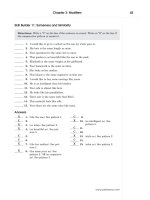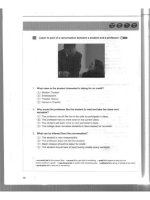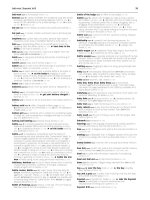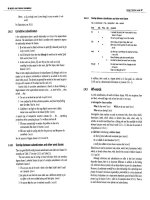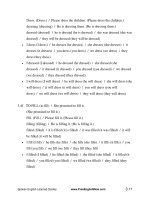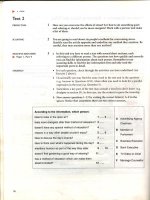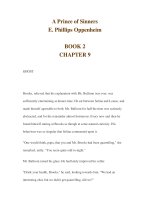Paragraphin corres 9 pot
Bạn đang xem bản rút gọn của tài liệu. Xem và tải ngay bản đầy đủ của tài liệu tại đây (98.53 KB, 6 trang )
If the answer could be one of the
object pronouns (me, him, her, us or
them), then you need ‘whom’ at the
beginning of the question:
Who/whom did you meet when you
went to London?
The answer could be: I met him.
WHOM did you meet?
(ii) Use this method if who/whom comes
in the middle of a sentence:
Break the sentence into two
sentences and see whether a subject
pronoun (I, he, she, we, they) is
needed in the second sentence or an
object pronoun (me, him, her, us,
them).
Here is the man who/whom can help
you.
Divide into two sentences:
Here is the man. He can help you.
Here is the man WHO can help you.
He is a writer who/whom I have
admired for years.
Divide into two sentences:
He is a writer. I have admired him for
years.
He is a writer WHOM I have admired
for years.
whole See
HOLE OR WHOLE?.
wholly (exception to the magic e- rule)
See
ADDING ENDINGS (ii).
who’s or whose? Use these exemplar sentences as a guide:
WHO’S been eating my porridge? (= who
has)
WHO’S coming to supper? (= who is)
182
WHOLE
WHOSE calculator is this? (= belonging
to whom)
There’s a girl WHOSE cat was killed.
wierd Wrong spelling. See
WEIRD.
wife (singular) wives (plural)
See PLURALS (v).
wilful (not willful)
will See
SHALL OR WILL?.
wining or winning? wine + ing = wining
win + ing = winning
See
ADDING ENDINGS (i) and (ii).
wisdom (exception to magic -e rule)
See
ADDING ENDINGS (ii).
withhold (not withold)
wolf (singular) wolves (plural)
See
PLURALS (v).
woman (singular) women (plural)
See
PLURALS (vi).
wonder See WANDER OR WONDER?.
won’t See
CONTRACTIONS.
woollen (not woolen)
worship worshipped, worshipping, worshipper
(exception to 2-1-1 rule)
See
ADDING ENDINGS (iv).
would See SHOULD OR WOULD?.
wouldn’t Take care to place the apostrophe
correctly.
would of Incorrect construction.
See
COULD OF.
wrapped See
RAPT OR WRAPPED?.
WRAPPED
183
TEAMFLY
Team-Fly
®
wreath or wreathe? Use these exemplar sentences as a guide:
She lay a WREATH of lilies on his grave.
(= noun)
Look at him WREATHED in cigarette
smoke. (verb, rhymes with ‘seethed’)
write Use these sentences as a guide to tenses:
I WRITE to her every day.
I AM WRITING aletternow.
I WROTE yesterday.
IhaveWRITTEN every day.
writer (not writter)
wry wrier or wryer, wriest or wryest
wryly (exception to the y- rule)
See
ADDING ENDINGS (iii).
wryness (exception to the -y rule)
See
ADDING ENDINGS (iii).
184
WREATH OR WREATHE?
Y
-y rule See ADDINGS ENDINGS (iii).
See PLURALS (iii).
yacht
yield See
EI/IE SPELLING RULE.
yoghurt/youghourt/ All these spellings are correct.
yougurt
yoke or yolk? Use these exemplar sentences as a guide:
The YOKE of the christening gown was
beautifully embroidered.
The oxen were YOKED together.
She will eat only the YOLK of the egg.
your or you’re? Use these exemplar sentences as a guide:
YOUR essay is excellent. (= belonging to
you)
YOU’RE joking! (= you are)
yours This is YOURS.
No apostrophe needed!
185
Z
zealot
zealous
zealously
Zimmer frame
zloty (singular) zloties or zlotys (plural)
See
PLURALS (iii).
zoological
zoology
186
Appendix A
Literary Terms
Here are a few of the most widely used literary devices. You will
probably be familiar with them in practice but perhaps cannot
always put a name to them.
alliteration the repetition of sounds at the beginning of words
and syllables.
" Around the rugged rocks the ragged rascals ran.
climax " I came; I saw; I conquered!
epigram a short pithy saying.
" Truth is never pure, and rarely simple. (Oscar Wilde)
euphemism an indirect way of referring to distressing or
unpalatable facts.
" I’ve lost both my parents. (= they’ve died)
" She’s rather light-fingered. (= she’s a thief)
hyperbole exaggeration.
" Jack cut his knee rather badly and lost gallons of blood.
" What’s for lunch? I’m starving.
" I loved Ophelia. Forty thousand brothers
Could not, with all their quantity of love,
Make up my sum. (Shakespeare: ‘Hamlet’)
irony saying one thing while clearly meaning the opposite.
" For Brutus is an honourable man. (Shakespeare: ‘Julius
Caesar’)
litotes understatement.
" He was not exactly polite.(=veryrude)
" Iamacitizenofno mean city.(=StPaulboastingabout
Tarsus and hence about himself)
metaphor a compressed comparison.
" Anna flew downstairs. (i.e. her speed resembled the speed of
abirdinflight)
" Sleep that knits up the ravelled sleeve of care. (Shakespeare:
‘Macbeth’)
187

